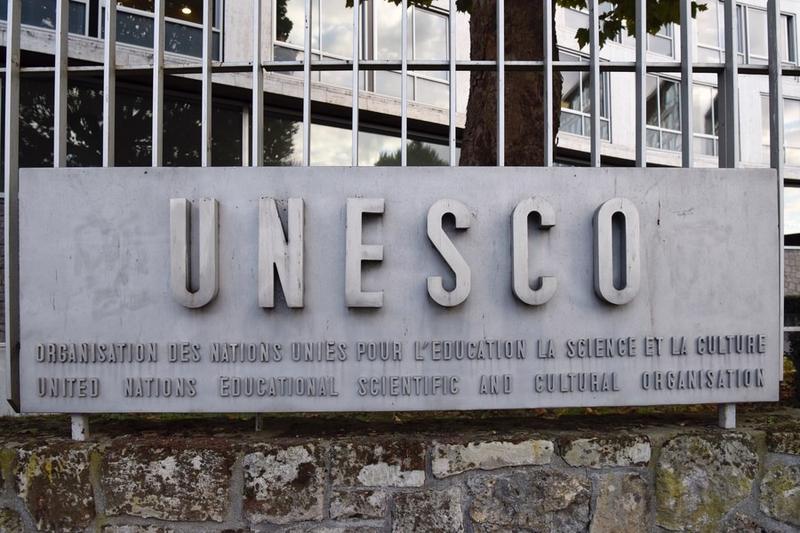 This Oct 12, 2017 photo shows the United Nations Educational, Scientific and Cultural Organization headquarters in Paris, France. (PHOTO / XINHUA)
This Oct 12, 2017 photo shows the United Nations Educational, Scientific and Cultural Organization headquarters in Paris, France. (PHOTO / XINHUA)
LONDON/BEIJING – China has called on the United States to shoulder its responsibilities and pay its arrears to the UNESCO after Washington's plan to rejoin the United Nations' cultural and scientific agency was announced on Monday.
"We hope this time the US decision is made out of a sense of responsibility and aimed at supporting multilateralism and contributing to international cooperation," Foreign Ministry spokesman Wang Wenbin said at a news conference on Tuesday.
Noting that Washington's withdrawals on two occasions from the body have had a negative impact on the organization's work, Wang said, "Membership of an international organization is something that should be taken seriously.
READ MORE: US, Israel exit UN cultural agency, claiming bias
"If the US is serious about what it means to rejoin the organization, it needs to show the sincerity of observing international rules and respecting international rule of law, and earnestly fulfill its due international obligation as a responsible nation," he added.
International organizations are not parks. Countries can't just come and go as they please.
Wang Wenbin, Spokesman, Foreign Ministry, China
"International organizations are not parks. Countries can't just come and go as they please," Wang said.
The return of the US is expected to be discussed and voted on UNESCO's 193 member states next month.
UNESCO Director-General Audrey Azoulay told member states about the US application on Monday.
UNESCO said Washington has agreed to pay more than $600 million in contributions it would have made, had it not left.
Yang Jin, China's ambassador to the organization, said that UNESCO needs every member state to join hands in fulfilling the organization's missions.
Yang said that the US should also fulfill its international obligations as a responsible country, which includes paying contributions owed to UNESCO in full as soon as possible.
It has been reported that the US had asked to rejoin over so-called fears that China had filled the gap in UNESCO policymaking created when then-US president Donald Trump took his country out in 2017, purportedly because of political bias in the Middle East.
Sourabh Gupta, a senior Asia-Pacific international relations policy specialist at the Washington-based Institute for China-America Studies, told China Daily that the US seems to want to rejoin "for all the wrong reasons", with it seemingly eager to take its "no-holds-barred" rivalry with China into another arena.
"Of course, the US will mostly fail to achieve this ambition because the vast majority of countries are not interested, or invested, in this zero-sum game, and would much prefer that the US works constructively with China within the framework of UNESCO."
Li Haidong, a professor at China Foreign Affairs University's Institute of International Relations, said the US has appeared arbitrary in withdrawing from international organizations and then seeking to rejoin.
"It seems that whenever it suits Washington's agenda to promote its so-called democracy and human rights protection, they emphasize their membership, but as soon as it becomes unnecessary, they swiftly dismiss it," Li said.
Xu Liping, a researcher at the Chinese Academy of Social Sciences' National Institute of International Strategy, said the US also hopes to repair its "tarnished international image".
ALSO READ: What's behind abrupt US withdrawal from UNESCO?
"It is worth noting that UNESCO holds considerable global influence, and the irony of withdrawing from such an organization that upholds values of freedom and respect for human rights, which the United States claims to champion, is not lost," Xu said.
According to the Associated Press, the administration of US President Joe Biden has already requested $150 million for the 2024 budget to go toward UNESCO dues and arrears. The plan foresees similar requests for the ensuing years until the full debt of $619 million is paid off. That makes up a big chunk of UNESCO's $534 million annual operating budget.
Zheng Wanyin in London contributed to this story.


